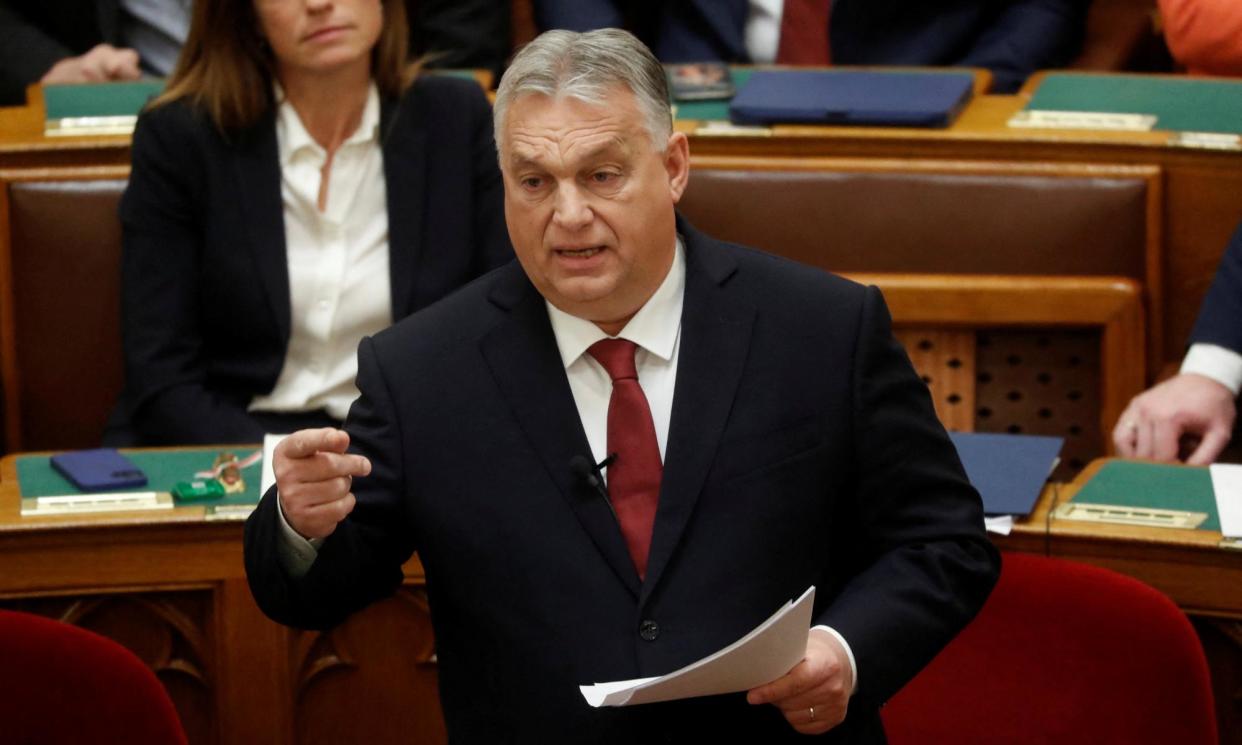EU leaders hope to face down Viktor Orbán over Ukraine funds veto

EU leaders hope to face down the Hungarian leader Viktor Orbán and keep their promise to find another €50bn (£43bn) for Ukraine despite his threat to veto extra funds during a crunch summit.
“There is no [one] plan B, there are plan Bs and if need be, we can go to Z,” said one diplomat, expressing the determination of the EU to ensure Orbán’s threats are not a barrier to Ukraine securing much-needed financial and military assistance to fight Russian invasion forces.
Orbán has also threatened to block opening formal negotiations on Ukraine’s EU membership, in a double whammy that Ukraine’s foreign minister has said would have devastating consequences for Kyiv.
On Wednesday diplomats expressed concern that Orbán’s tough talk on EU enlargement was attracting strategic company. “We can see a new group of countries taking a different perspective on the candidate status of Ukraine than they did last year,” one diplomat said. “And this group clearly consists of … Slovenia, Slovakia, Austria, very much Italy, very strongly. They are saying no money for Ukraine unless there’s money for … citizens. That’s quite new,” they said. Italian sources say Meloni is not putting such conditions on funds for Ukraine.
Hungary and EU leaders have been at loggerheads for the past few weeks amid repeated threats by Orbán to use his veto to stop key decisions at a pivotal summit of EU leaders in Brussels.
This week Orbán reaffirmed his opposition to offering neighbouring Ukraine fast-track accession at the summit, saying this would not serve the interests of Hungary or the 27-member EU.
“The problem is we don’t know his game,” a diplomat said. “Is it classic Orbán, with very, very harsh positions and then a deal? Or is it a longer term play … the sense is it’s very different this time.”
The new Polish prime minister and former European Council president, Donald Tusk, set a placatory tone when he arrived in Brussels, warning that “apathy on Ukraine is unacceptable” but describing Orbán as “pragmatic” and a “colleague”. Some said this was a “small price to pay” for Hungary’s support. Others said the commission decision was unfortunate timing but “not about horse trading”.
Hungary has been accused of trying to blackmail the EU into unblocking more than €20bn in withheld funds.
EU leaders will be hoping that the European Commission’s decision on Wednesday evening to unblock €10.2bn of €31bn in withheld funds will help soften the Hungarian leader’s position.
One diplomat said: “We do not pay a price for political decisions.”
Sources say under the rules the European Commission had no choice but to release the money within the next 10 days as a three-month window for investigations into Hungary’s reforms comes to an end next week.
“These funds are not locked,” a source said. “The funds are open and have always been there for Hungary to take. But they themselves have decided not to send in a request for payments because they can’t meet the milestones set out to meet EU standards on rule of law.”
Related: War or peace? Dictatorship or democracy? Europe’s future is on the line | Timothy Garton Ash
Some EU leaders maintain a sliver of hope that it is “classic Orbán” that joins the summit on Thursday. Of the €50bn being pledged to Ukraine, just €17bn is cash and the remainder in loans. “I have not heard any objections on Hungary for the loans, only objects on the grants, how the money would be spent and who would check it,” said one diplomat.
Orbán, a far-right nationalist, is the closest ally in the EU of the Russian president, Vladimir Putin. He has claimed he could not endorse Ukraine’s membership journey because the country was “a joke” and “one of the most corrupt countries in the world”.
Leaders are hoping they can isolate him in the room over the next 48 hours and persuade him that Ukraine hascompleted 80% of the reforms required of it. But already leaders are taking about “bleak” scenarios with a fudged declaration at the end committing the EU to membership talks but not until next spring when Ukraine is due to complete the last reforms.
Rows are also expected about the wider midterm review of the EU budget, already slashed from €66bn to €25bn through intense rounds of daily negotiations between ambassadors over the weekend and this week.
The €25bn includes the €17bn in loans for Ukraine but some countries insist the total can be reduced further with some EU programmes such as a programme on new technologies in peril in order to make savings.

 Yahoo News
Yahoo News 
